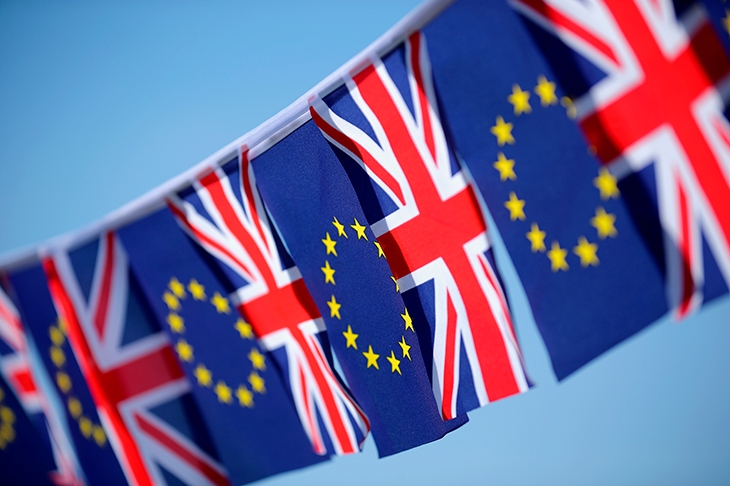On Monday morning, Clément Beaune, Emmanuel Macron’s Europe Minister, clipped out the section of his media interview criticising Britain’s vaccination strategy and posted it on Twitter. He declared: ‘What is happening in the UK is not something I envy. It is a strategy of massive acceleration which also means taking more risks because the Covid situation is much worse there.’
Such remarks are becoming something of a habit for Beaune. He fired off tweets lambasting Brexit in the days after the deal was done and grinned broadly in an interview this year when he was questioned about reports that British cabinet ministers had asked him to tone it down on his Twitter account.
Macron has also been critical of the UK vaccination programme. In a conversation with journalists last month he said the Oxford-AstraZeneca vaccine was ‘quasi–ineffective’ for the over-65s, although he admitted he had no data to back this up. The jab was subsequently approved for all age groups by the World Health Organisation.
It is not just the French who have taken pot shots at the British approach. Ursula von der Leyen, the European Commission President, has said that countries which used emergency authorisation to get vaccines approved, as the UK had done, failed in their ‘gigantic responsibility’ to ensure that everything was safe before proceeding.

These attacks on the UK’s vaccine programme are revealing. In part, they are simply a means for politicians to defend themselves against criticism. Given the stick von der Leyen was getting over the Commission’s procurement of vaccines for EU countries, it was understandable that she would try to suggest that places that were further ahead had cut corners. But there is something else going on here.
There have always been those on the European side who believe that for the EU project to succeed, Brexit must fail and must be seen to fail. So it is a problem that the first major act of Brexit Britain — going its own way to obtain and approve vaccines — appears to have been a success. For this reason, EU leaders must cast doubt on the achievement. The sensitivity is such that when one British minister spoke to a European opposite number earlier this month about an exports issue, he was told that it would help matters if UK politicians stopped linking the speed of the vaccine programme to Brexit.
To be fair, there is a Brexiteer version of this hostile sentiment. You can find those on the Tory back benches who think that Britain’s success requires the EU’s failure; that the decision to leave will be vindicated if the EU collapses. This is a failure to understand the sheer level of political will there is to keep the European project going.
What the EU and the UK need to realise is that they will both be better off if the other succeeds
The desire to show that Brexit has not worked is particularly strong in France. The next presidential election is in the spring of next year and Macron’s second-round opponent is likely to be Marine Le Pen, who once advocated France leaving the EU. If Macron could point to clear damage that Brexit had done to Britain, then that would help him in his attacks on her.
Leaving the single market and the customs union was always going to alter Britain’s trade with Europe. But so far there has not been the chaos at the ports that many feared. Indeed, by far the worst disruption occurred in December, when the French government shut the borders to try to keep out the Kentish Covid mutation.
The EU is clearly within its rights to treat Britain as a ‘third country’. That is, after all, the reality of the new UK-EU relationship. But in some areas the EU is going beyond what is required by its own rules, making, for example, the export of bivalve molluscs such as oysters and mussels more difficult than it needs to be. One of those involved in discussions with the EU about this issue complains that ‘they’re going out of their way to make a point’, and that ‘their motivation is how do we prove that Brexit is a mistake’. One experienced government Brexit hand describes it as an ‘act of petty vengeance’.
Another likely quarrel in the near future will be the EU’s refusal to grant ‘equivalence’ to UK financial services. Andrew Bailey, the governor of the Bank of England, urged Brussels to do so last week, and by the logic of the EU’s rules it should. But few in Whitehall expect equivalence to be granted unless Britain signs up to being a regulatory rule-taker, and you can’t run a global financial centre by cutting and pasting someone else’s regulations.
Then there is the Northern Ireland protocol issue. Micheál Martin, the Taoiseach, warned recently that: ‘This isn’t an ongoing battle between the UK and some of the bigger beasts of Europe. Let’s move away from that. They need to cool it.’ The fact that he felt the need to say this — despite the irritation it was bound to cause in some EU capitals — was highly revealing. His comments hint at Dublin’s concern that some EU states are more interested in proving a point than the situation in Northern Ireland.
What the EU and the UK need to realise is that they will both be better off if the other succeeds. The UK is the EU’s third- largest trading partner and a key contributor to European security. The EU is the UK’s largest export market. It makes no sense for either side to wish the other to fail. It will be tempting for the UK to respond to EU decisions on molluscs and the like by launching tit-for-tat measures. That would be a mistake. The two sides need to find a way to be good neighbours and escalating disputes will not promote that cause.
When it comes to future economic competition between the UK and the EU, the UK needs to find new ways to drive growth. Two Tory MPs, Bim Afolami and Laura Trott, have proposed a plan for ‘accelerator zones’ in university towns and cities, which would have simplified planning rules and a zero rate of capital gains for investments held for seven years or more. This is the kind of creative thinking the Tory party needs if it is to boost this country’s growth potential.
It is time for the EU and the UK to build a new neighbourly relationship. If they can’t do that, then the EU-UK partnership council — which is meant to manage the future relationship — will become the great mis-nomer of the 21st century.









Comments
A blooming good offer
Join the conversation with other Spectator readers by getting the next 3 months for £3.
CLAIM OFFER 3 months for £3Already a subscriber? Log in